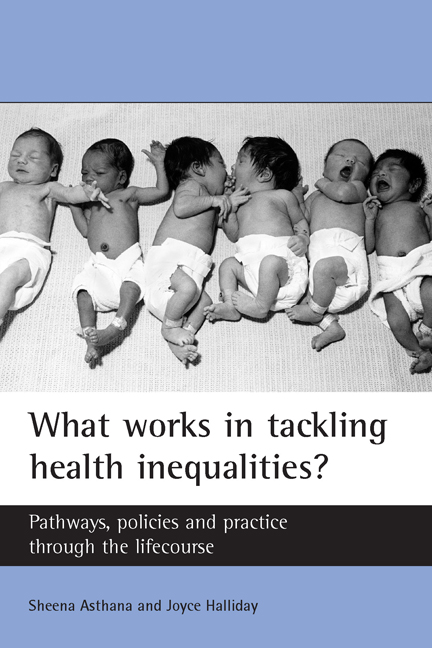Book contents
- Frontmatter
- Dedication
- Contents
- List of tables, boxes and figure
- Acknowledgements
- List of abbreviations
- one Introduction
- Part 1 The research and policy context of health inequalities
- Part 2 Health inequalities pathways, policies and practice through the lifecourse
- Part 3 Tackling health inequalities: developing an evidence base for public health
- Index
two - Researching health inequalities
Published online by Cambridge University Press: 14 January 2022
- Frontmatter
- Dedication
- Contents
- List of tables, boxes and figure
- Acknowledgements
- List of abbreviations
- one Introduction
- Part 1 The research and policy context of health inequalities
- Part 2 Health inequalities pathways, policies and practice through the lifecourse
- Part 3 Tackling health inequalities: developing an evidence base for public health
- Index
Summary
Introduction
Since the publication in 1980 of the Black Report there has been a dramatic growth in research undertaken on health inequalities. This partly reflects the fact that variations in health lend themselves to analysis from a range of perspectives – social, geographical and historical (see Chapter One). Health variations are remarkably pervasive, being found at all stages of the lifecourse and pertaining to a very wide range of diseases and conditions, and have become an important focus of policy making. Consequently, research into health inequalities attracts interest from a wide range of disciplines, such as sociology, geography, psychology, epidemiology and medicine. Its interdisciplinary nature has resulted in research that is empirically robust and theoretically innovative. Health inequalities is also an area in which international research collaboration is increasingly being forged, particularly around the identification of effective policies and interventions.
By adopting a lifecourse perspective to structure and organise this book, and examining key lifecourse theories, we have responded to what has been described as one of the most important recent developments in epidemiology and public health. For example, Chapter Four discusses evidence of latent effects whereby early life environments affect adult health independently of subsequent experience. Chapter Eight builds on the concept of pathway effectsin which individuals follow different (often self-reinforcing) trajectories of life experiences which are health damaging or health enhancing, while Chapters Ten and Twelve explore the implications of the model of cumulative effects. This suggests that because health-damaging exposures gradually accumulate over time to increase the risk of chronic disease, better circumstances in adulthood and even old age can ameliorate the impact of a poor start in life.
In addition to discussing these models with reference to their significance to different periods of the lifecourse, it is important to place them in their wider research context. To this end, this chapter traces the development of research interest in health inequalities since 1980 noting that, although it is in many ways more sophisticated in its approach to explaining health inequalities, lifecourse epidemiology owes much to the legacy of the original Black Report. A developmental perspective thus illustrates some of the continuities that exist in health inequalities research.
- Type
- Chapter
- Information
- What Works in Tackling Health Inequalities?Pathways, Policies and Practice through the Lifecourse, pp. 21 - 56Publisher: Bristol University PressPrint publication year: 2006



